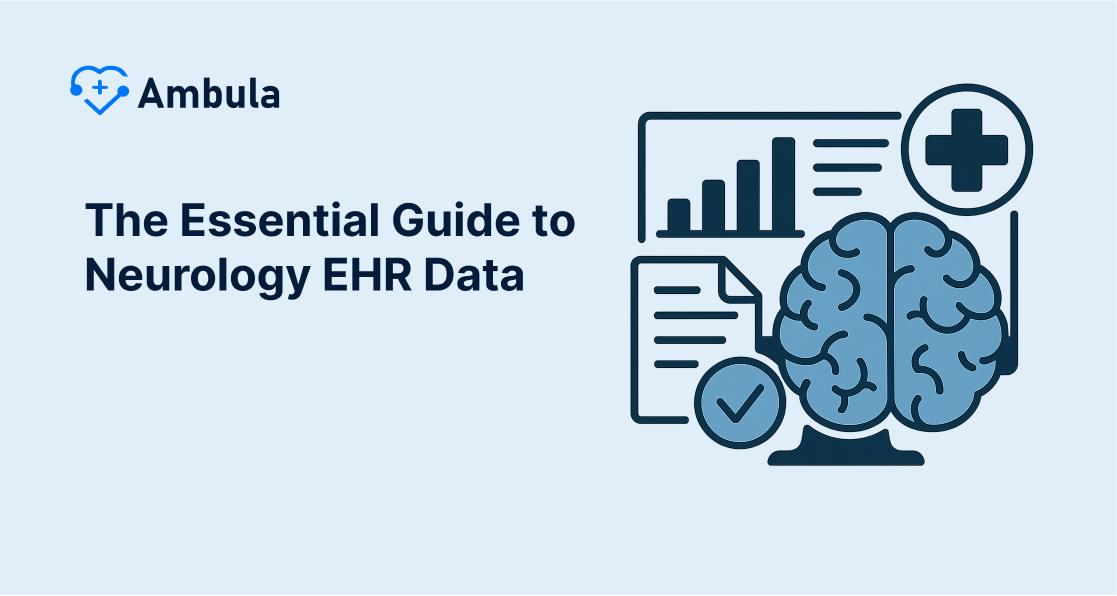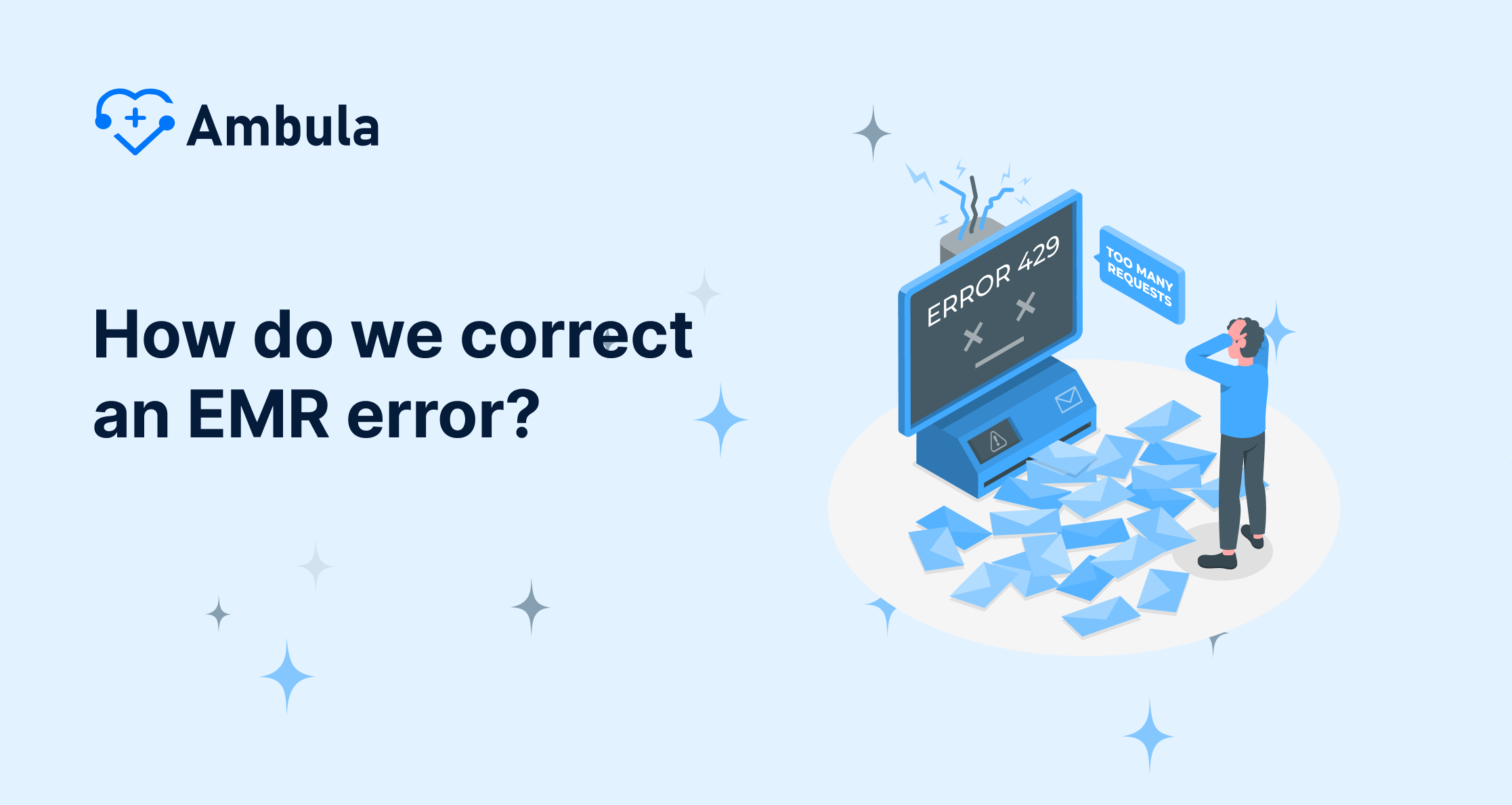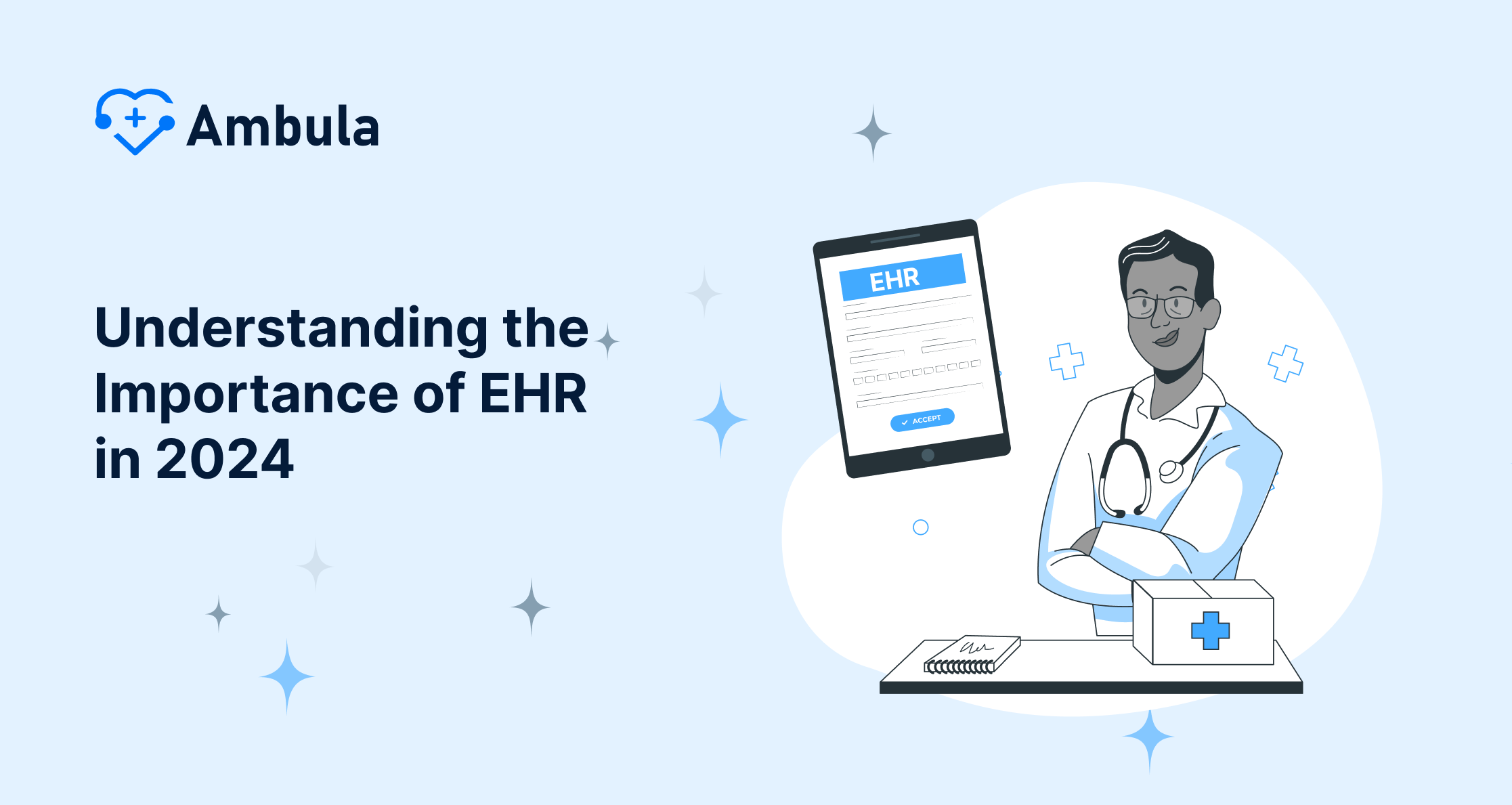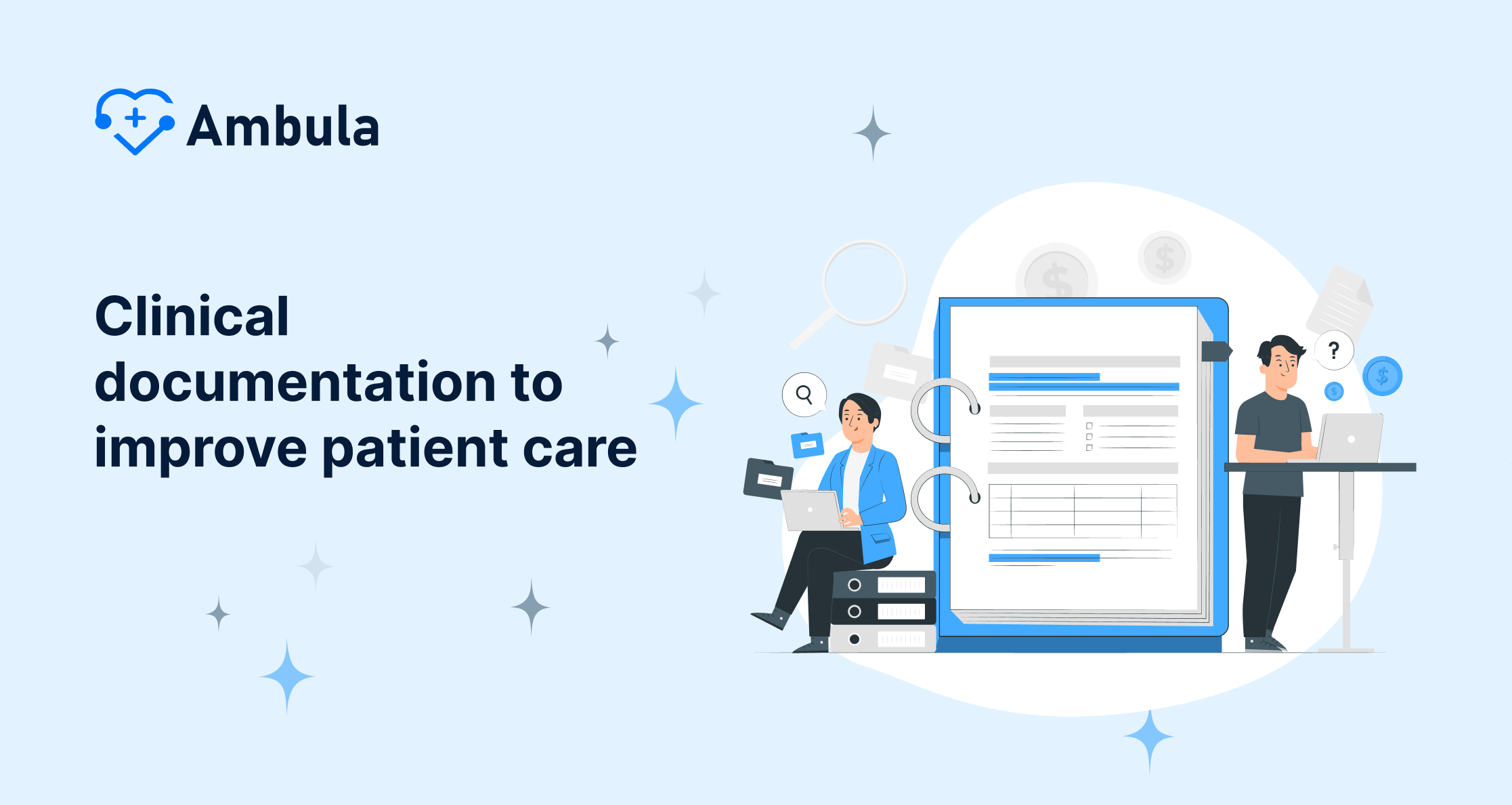Mental health EHR data refers to the digital collection of patient information, encompassing a wide range of sensitive details such as diagnostic assessments, treatment plans, therapy notes, medication records, and progress reports. This data is stored and managed electronically within a Mental health EHR system, designed specifically for mental health practices. The transition from paper-based records to EHRs has revolutionized the way mental health professionals operate, offering enhanced efficiency, accessibility, and security. Understanding the importance of this data is crucial for appreciating its impact on patient care, administrative processes, and research advancements in the field of mental health. Effective management of EHR data ensures that clinicians can provide informed, coordinated, and personalized care to their patients, ultimately leading to better outcomes and improved overall well-being.
Benefits of Using EHR Data in Mental Health Practices
The adoption of EHR systems in mental health practices brings forth a multitude of benefits that significantly enhance the quality of care and streamline administrative operations. One of the primary advantages is improved care coordination, as EHRs facilitate seamless communication and information sharing among various healthcare providers involved in a patient’s treatment. This eliminates the risk of miscommunication and ensures that all professionals have access to the most up-to-date and accurate patient information.
Recent data shows that 78% of physicians using EHRs report overall enhanced patient care, with this figure rising to 85% for those with Meaningful Use-certified EHR systems and at least two years of experience. Additionally, EHRs streamline administrative tasks such as billing, scheduling, and insurance claims processing, reducing paperwork and freeing up staff time to focus on patient care.
Patient engagement is also enhanced through features like online portals, where patients can access their records with accuracy of data assured, schedule appointments, and communicate with their providers, fostering a more collaborative approach to treatment. In fact, 52% of UK medical professionals report utilizing online booking systems for appointments, reflecting the broader shift toward digital scheduling methods that benefit both providers and patients.
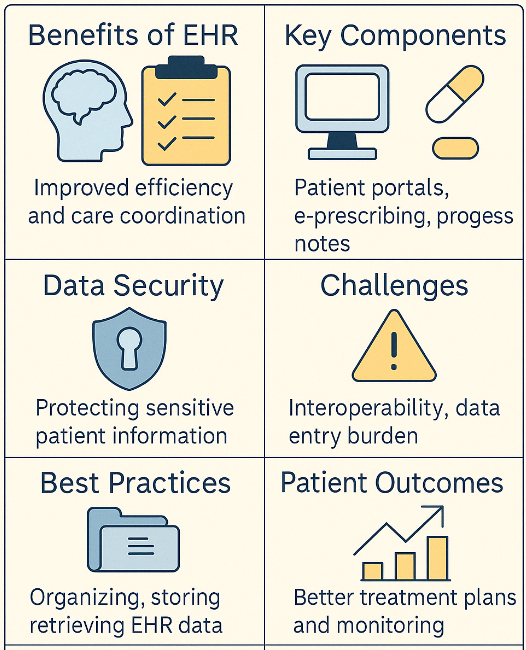
Key Components of a Mental Health EHR System
A comprehensive mental health EHR system comprises several key components that work together to support the unique needs of mental health professionals. Secure data storage is fundamental, ensuring that sensitive patient information is protected through robust measures such as encryption, access controls, and audit trails. Telehealth integration is another essential feature, enabling remote consultations and virtual therapy sessions, which have become increasingly important in expanding access to care.
Compliance tools are also crucial, helping practices adhere to regulatory requirements like HIPAA and other privacy laws, safeguarding patient confidentiality and ensuring legal compliance. Furthermore, specialized templates for assessments, treatment plans, and progress notes cater to the specific documentation needs of mental health clinicians, improving efficiency and accuracy.
The adoption of EHR systems varies significantly by specialty, with psychiatric hospitals showing an 84% adoption rate of any EHR and 75% adoption of Certified EHR Technology (CEHRT). This demonstrates the growing recognition among mental health providers that specialized EHR systems with strong data quality principles for EHR are vital for quality care delivery.
The Importance of Data Security and Privacy
In the realm of mental health, data security and privacy are of utmost importance due to the highly sensitive nature of patient information. Protecting patient confidentiality is not only an ethical obligation but also a legal requirement under regulations like HIPAA. Robust security measures, including encryption, access controls, and regular security audits, are essential to prevent unauthorized access, data breaches, and cyberattacks.
Privacy considerations extend beyond mere data protection, encompassing the need to ensure that patient information is used responsibly and ethically, with patient consent and transparency. Maintaining patient trust is paramount, and it relies heavily on the assurance that their data is handled with the utmost care and confidentiality.
For mental health providers, these concerns are amplified due to the stigma associated with mental health conditions and additional privacy regulations such as 42 CFR Part 2 for substance use disorder information. These more stringent confidentiality regulations make data sharing and system integration more challenging but absolutely essential for ethical practice.
Challenges in Managing Mental Health EHR Data
While EHR systems offer numerous advantages, managing mental health EHR data also presents several challenges that practices must address. Interoperability, or the ability of different EHR systems to exchange information seamlessly, can be a significant hurdle, hindering care coordination and data sharing among providers.
Maintaining data accuracy and completeness is another challenge, requiring diligent data entry practices and regular quality checks to ensure that patient records are reliable and up-to-date. Privacy concerns are particularly salient in mental health due to the stigma associated with mental health conditions, necessitating heightened security measures and patient education to foster trust and encourage data sharing for treatment purposes.
Additionally, the initial cost of implementing and maintaining EHR systems, as well as the learning curve for staff, can pose challenges for some practices. Historically, the behavioral health sector has received less financial support compared to general medical care when it comes to adopting health information technology. While the HITECH Act of 2009 provided substantial funding for hospitals and clinics to implement EHRs, behavioral health providers were largely excluded from these federal incentives, resulting in a slower adoption rate in mental health practices.
Best Practices for Data Management
To effectively manage mental health EHR data, practices should adhere to a set of best practices that promote accuracy, security, and efficiency. Regular audits are crucial to ensure data accuracy, identify errors or inconsistencies, and maintain the integrity of patient records. Staff training is essential to ensure that all personnel are proficient in using the EHR system, following proper data entry procedures, and adhering to security protocols.
Standardized documentation processes should be established to promote consistency in record-keeping, reduce variability, and improve the overall quality of data. Implementing robust access controls and audit trails can help track user activity and prevent unauthorized access to patient information. Furthermore, regular backups and disaster recovery plans are vital to safeguard against data loss and ensure business continuity.
Among all physicians using EHRs, 81% report the critical benefit of remote access to patient charts, increasing to 87% for experienced users with certified systems. This remote accessibility is especially valuable for mental health providers who may need to access patient information during crisis situations or after hours.
How EHR Data Improves Patient Outcomes
The effective utilization of EHR data has a profound impact on improving patient outcomes in mental health care. Analyzing EHR data allows clinicians to identify trends, patterns, and risk factors, enabling them to provide more personalized and evidence-based treatment plans. By tracking patient progress over time, clinicians can monitor the effectiveness of interventions, make necessary adjustments, and optimize treatment strategies.
EHR data also facilitates better coordination of care among different providers, ensuring that patients receive comprehensive and integrated treatment. Furthermore, EHRs can support patient engagement through features like patient portals, which empower patients to actively participate in their care, access educational resources, and communicate with their providers.
Clinical benefits reported by EHR users include alerts for potential medication errors (65% of all users), alerts for critical lab values (62%), reminders to provide preventive care (47%), and reminders for guideline-compliant care for chronically ill patients (45%). These features are particularly valuable in mental health settings where medication management is crucial and where preventive interventions can significantly impact long-term outcomes.
The Role of EHR Data in Telehealth for Mental Health
EHR data plays a crucial role in facilitating telehealth services for mental health, enabling remote consultations, virtual therapy sessions, and remote patient monitoring. Telehealth integration within EHR systems allows clinicians to access patient records, conduct video conferences, and securely exchange information, all within a single platform.
This seamless integration enhances efficiency, improves care coordination, and expands access to mental health services, particularly for patients in underserved areas or those with mobility issues. EHR data also supports remote patient monitoring, allowing clinicians to track patient progress, monitor medication adherence, and intervene proactively when necessary. The use of EHR data in telehealth not only improves the convenience and accessibility of care but also enhances the continuity and quality of treatment.
Today’s patients expect more involvement in their care plans – not just viewing lab results or progress notes, but actively participating in treatment processes with real-time access to care plans, providing feedback, setting goals, and tracking progress. This collaborative approach is particularly valuable in mental health care, where patient engagement is critical for successful outcomes.
Future Trends in Mental Health EHR Data
The field of mental health EHR data is constantly evolving, with several emerging trends poised to transform the way data is managed and utilized. Artificial intelligence (AI) is expected to play a significant role in analyzing EHR data to identify patterns, predict outcomes, and provide clinical decision support. Enhanced data exchange through interoperability standards will facilitate seamless information sharing among different healthcare systems, improving care coordination and reducing administrative burden.
Blockchain technology offers the potential to enhance data security and privacy by providing a decentralized and tamper-proof record of patient information. Furthermore, the integration of wearable devices and mobile health apps with EHRs will enable continuous monitoring of patient health and facilitate personalized interventions. These future trends hold the promise of revolutionizing mental health care, making it more efficient, effective, and patient-centered.
As digital expectations rise, patients are seeking more streamlined, tech-driven solutions for managing their mental healthcare with the same ease they manage other aspects of their lives. This includes the ability to schedule appointments digitally, secure asynchronous communication with care teams, and active participation in treatment planning.
Maximizing the Potential of Mental Health EHR Data
In conclusion, mental health EHR data represents a valuable asset that, when properly managed and utilized, can revolutionize mental health care and practice management. By embracing EHR systems and adhering to best practices for data management, practices can improve efficiency, enhance care coordination, and achieve better patient outcomes.
The key lies in understanding the importance of data security and privacy, addressing the challenges associated with EHR implementation, and leveraging the power of data analytics to inform clinical decision-making. With psychiatric hospitals showing an 84% adoption rate of EHR systems and a growing emphasis on digital patient engagement, the mental health field is embracing technological transformation. As technology continues to advance, the future of mental health EHR data holds immense potential for further innovation and transformation, ultimately leading to a more effective, accessible, and patient-centered mental health care system.
BellMedEx makes mental health data claims and reimbursements happen, period! Trust your EHR management to the company that optimizes each invoicing phase, armed with clinical knowledge and zeal for first-class claims processing.
References
- Behavioral Health Providers Falling Behind in EHR Adoption Critical to Participate in Value-Based Care. (2021). BH Business. https://bhbusiness.com/2021/11/13/behavioral-health-providers-falling-behind-in-ehr-adoption-critical-to-participate-in-value-based-care/
- Kim, J., Lim, S., Park, H. (2016). Hospital Characteristics Associated with Certified EHR Adoption among US Psychiatric Hospitals. National Center for Biotechnology Information. https://pmc.ncbi.nlm.nih.gov/articles/PMC7135123/
- MACPAC. (2022). Encouraging Health Information Technology Adoption in Behavioral Health. Medicaid and CHIP Payment and Access Commission. https://www.macpac.gov/wp-content/uploads/2022/06/Chapter-4-Encouraging-Health-Information-Technology-Adoption-in-Behavioral-Health.pdf

